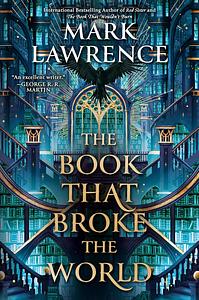Take a photo of a barcode or cover
adventurous
mysterious
medium-paced
Plot or Character Driven:
A mix
Strong character development:
Yes
Loveable characters:
Yes
Diverse cast of characters:
Yes
Flaws of characters a main focus:
Complicated
WHY did this have to start with a new character. My disappointment level was extreme; I wanted Evar and Livira! All my thoughts were with them, not really focused on the new thread of the story.
Putting that aside it was still a great read, love how it all came together and the set up for the next book
Putting that aside it was still a great read, love how it all came together and the set up for the next book
adventurous
dark
emotional
mysterious
tense
fast-paced
Plot or Character Driven:
Plot
Strong character development:
No
Loveable characters:
Yes
Diverse cast of characters:
N/A
Flaws of characters a main focus:
No
adventurous
challenging
dark
emotional
mysterious
sad
tense
medium-paced
Plot or Character Driven:
A mix
Strong character development:
Complicated
Loveable characters:
Complicated
Diverse cast of characters:
Yes
Flaws of characters a main focus:
Yes
adventurous
dark
tense
medium-paced
Plot or Character Driven:
Character
Flaws of characters a main focus:
Yes
At first it was hard getting into yet other characters, but in the end it was nice to read. It feels a bit like the ending was done just so another book could be written with the same plot of Liviria and Evar trying to find each other.
adventurous
mysterious
adventurous
challenging
dark
mysterious
fast-paced
Plot or Character Driven:
Character
Strong character development:
Yes
Loveable characters:
Yes
Diverse cast of characters:
Yes
Flaws of characters a main focus:
Complicated
I still found all the time jumps and call backs a bit confusing, but I love the characters. This is almost like half a sequel. It was so short and did not move the plot very much. A lot of set up.
adventurous
mysterious
reflective
medium-paced
Plot or Character Driven:
Plot
Strong character development:
Yes
Loveable characters:
Yes
Diverse cast of characters:
Yes
Flaws of characters a main focus:
Yes
adventurous
challenging
mysterious
medium-paced
adventurous
emotional
tense
medium-paced
Plot or Character Driven:
A mix
Strong character development:
Yes
Loveable characters:
Yes
Diverse cast of characters:
Yes
Flaws of characters a main focus:
Complicated






